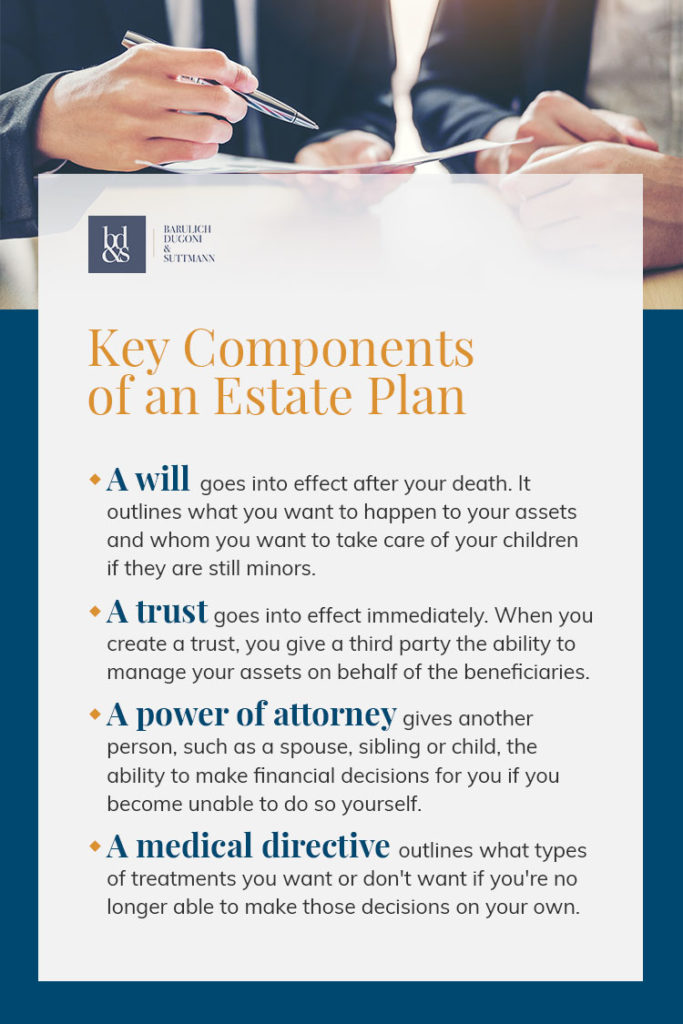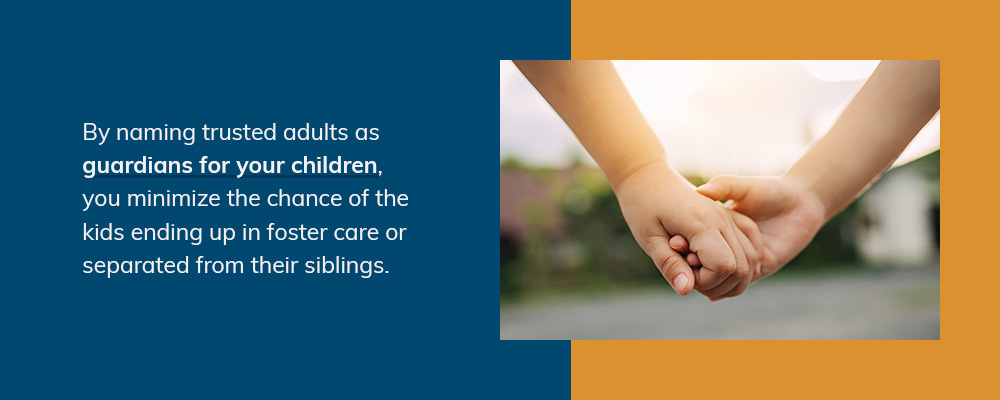When to Start Estate Planning
When you think about wills, trusts and estate planning, it’s natural to assume they are things you don’t need. You might be young or not own many things of value just yet. If you’re older, you might think you don’t own enough or have enough money.
The truth is, you do need an estate plan, whether you’ve just turned 18, are in your 30s or are approaching retirement. Your plan should evolve as you move through life, taking into account your particular situation and needs.
Learn more about the process of estate planning, then contact an attorney to find out how you can get started making a will and putting together a plan for your estate.
What Goes Into Estate Planning
An estate plan lays out what you want to happen to your assets after your death. It also outlines what you want to happen should you become incapacitated and unable to make your own decisions.
Often, a goal of estate planning is to allow your heirs to receive their inheritance without a hefty tax bill and disagreements or lengthy legal battles. Since the laws for estate planning vary by state and the process can become complex, even if you only have a few assets, it’s important to hire a legal professional to assist you in the creation of your estate plan.
Assets in an Estate Plan
The assets in your estate plan are any items you own, whether tangible or intangible. An obvious example of an asset is a house, but smaller-ticket items also fall under this category. An asset can be something that has more sentimental value than market value, too. Some examples of tangible assets include:
- Your home and other real estate.
- Any vehicles.
- Family heirlooms, including jewelry.
- Collectible items and antiques.
- Your clothing.
- Other personal possessions.
Your estate might also consist of intangible assets, such as:
- Bank accounts.
- Retirement accounts.
- Health savings accounts.
- Life insurance policies.
- Ownership of a business.
- Stocks and bonds.
Part of creating an estate plan involves determining the value of your assets. In some cases, that can be easy to do. The amount in your savings account is how much it’s worth. An appraiser can assess your home or car and tell you its worth.
Other items, such as those with sentimental value, might not have much market worth but can be valuable to your family members. Being clear about who inherits the sentimental items can help to minimize disputes after your death.
Wills, Trusts and Other Directives

An estate plan should be made up of several directives, which let the court know what you want to happen to your assets after your death. Your directives also inform the court of your medical care wishes and whom you want to look after your children.
Wills, trusts and other directives all make up the key components of an estate plan. Take a look at what each one does:
- Will: A will is a document that goes into effect after your death. It outlines what you want to happen to your assets and whom you want to take care of your children if they are still minors. After your death, a will goes through the probate process, meaning the court reviews it. During probate, family members have the opportunity to contest a will.
- Trust: A trust is a document that goes into effect immediately after its creation. When you create a trust, you give a third party the ability to manage your assets on behalf of the beneficiaries. Trusts don’t go through probate and can’t be contested. Trusts can take several forms, so it’s a good idea to speak with an attorney to find out which one is best for you.
- Power of attorney: A power of attorney gives another person, such as a spouse, sibling or child, the ability to make financial decisions for you if you become unable to do so yourself. The person you choose as power of attorney can pay your bills or sell your home in your stead.
- Medical directive: A medical directive outlines what types of treatments you want or don’t want if you’re no longer able to make those decisions on your own.
Choosing Your Executor, Guardians and Beneficiaries
Part of the estate planning process is choosing the people who will benefit from your estate and carrying out the estate plan after your death.
The individual who carries out your will is the executor. If you don’t choose an executor yourself, the court will appoint one for you, which isn’t always ideal. An attorney can help you choose the person who’s best suited to the role of executor, based on their relationship with you and their maturity level.
You’ll also want to name beneficiaries in your estate plan. Since you might have named beneficiaries on retirement and savings accounts, too, the beneficiaries in your will must match those on your accounts.
It’s also important to review your beneficiaries and update them as needed. For example, if you make an estate plan in your 20s, when you’re married, then you later get divorced, you’ll want to remove your ex-spouse as a beneficiary. Similarly, if you made your estate plan before the arrival of children and grandchildren, you may want to update your beneficiaries later on.
If you have minor children, you’ll want to choose someone to act as their guardian in case of your death. It’s often better to name multiple people as guardians if circumstances prevent your first pick from stepping up to the task. For example, your first pick might end up moving across the country or have several children of their own and be unable to financially provide for your kids.
Along with naming a guardian, it’s a good idea to outline how you want your child to be raised. For example, you might want your children to learn about a particular religion or to attend a certain type of school.
At What Age Should You Start Estate Planning?
What’s the right age to start thinking about a will or estate plan? The answer is any age. You’re never too young or too old to create an estate plan. If you created a plan years ago and haven’t reviewed it in a while, it’s a good idea to re-evaluate it and make updates if necessary.

The details of your estate plan can vary by age and life circumstances. Decade by decade, here’s what your estate plan might include:
- 20s: In your 20s, you might not have a lot of assets yet, but you might be on your way to buying a home. You might have a child or be thinking of starting a family soon. A will can outline who gets your stuff and who will take care of any children. It’s also important to choose a power of attorney and to create a medical directive at this age.
- 30s: In your 30s, you might have more assets, such as a car, a home and a few valuables. You might have started to build up a retirement account. You should update your will to account for any recently acquired assets. If you’ve made major life changes, such as getting married or divorced, you can update your power of attorney and medical directive, too.
- 40s: If you’re in your 40s and haven’t yet created an estate plan, now’s the time to do it. If you have children, it’s critical to choose guardians for them. Also, name a power of attorney and create a directive that outlines your medical wishes.
- 50s: Your life might have changed dramatically by the time you reach your 50s. Your children might be grown and no longer in need of a guardian. You might have divorced and remarried. You might have sold your first home and purchased another or bought a second home as a vacation home.
- 60s and after retirement: Once you get to retirement age, you can update your estate plan as needed based on life circumstances. For example, a beneficiary might die before you do, or you might have a falling out with one of your beneficiaries. You might also get married again in retirement and want to update your estate plan to reflect that.
The Importance of Starting Estate Planning Early
When you’re young and have few responsibilities, it can be easy to put off creating an estate plan. You might assume you don’t need one since you don’t have children or property. However, the sooner you start estate planning, the better, for several reasons.
For one thing, having an estate plan eliminates any questions and reduces the risk of family disputes if you do die young. You might not have big-ticket items just yet, but you may have possessions that matter to your loved ones, such as an extensive library or sentimental clothing.
Once higher-value tangible property or children enter the scene, an estate plan becomes critical, even if you’re still in your 20s. Having an estate plan protects your children. By naming trusted adults as guardians for your children, you minimize the chance of the kids ending up in foster care or separated from their siblings.
Estate planning as soon as possible also speeds up the probate process after your death. If you work with an attorney to create a trust, your estate can skip the probate process.
While a will still goes through probate, the process is typically faster when there’s a will compared to when there isn’t one.

Do You Need a Will or Trust?
Wills and trusts are separate documents. An estate plan can have both. Not everyone needs both a will and a trust in their plan, though.
For the most part, everyone needs a will, and you should create a will, along with a medical directive, when you first create your estate plan. You also want to choose a power of attorney when you create your estate plan. An attorney can guide you through the process of writing a will and medical directive and choosing your power of attorney.
You might not need to create a trust when you create an estate plan. Usually, trusts are better suited for people with young children and assets. An attorney can help you decide if you need both a trust and a will and when the right time is to create a trust.
When to Update Your Existing Estate Plan
Once you’ve created an estate plan, don’t file it away in a drawer and forget about it. It’s important to review and update your plan regularly. Usually, the best time to update your estate plan is after any life change, no matter how major or minor.
Life Events That Can Trigger an Estate Plan Update
Some examples of life events that should trigger a review and update of your estate plan include:
- Marriage: When you get married, your spouse usually becomes the automatic beneficiary of your assets. Marriage can also increase the number of assets you own or the value of your assets, particularly if you share everything with your spouse.
- Birth or adoption of a child: Having a first child or adding new children to your family should trigger a review of your estate plan. At the very least, you’ll want to assign people to act as guardians for your children. As your kids get older and start having children, you’ll also want to update your estate plan.
- Divorce: After a divorce, remove your ex-spouse as a beneficiary. In some states, a divorce can make an existing estate plan null and void, so you’ll need to create a new one.
- Death of a loved one: If someone you named as the executor or guardian for your children dies, you should update your plan and choose a new executor or guardian. The same is true if a beneficiary dies before you.
- Buying or selling property: Update your estate plan as your assets change. After you buy a home, update your plan to include the beneficiaries for it. The same is true if you purchase a second property or if you end up selling a home or vehicle.
- Opening or closing accounts: Your estate plan needs updating when you open new accounts, such as a new retirement or savings account. The same is true when you close accounts.
- Starting or closing a business: If you own a business, you’ll want to update your estate plan when you start the company. If you end up selling or closing the company, you should update your estate plan accordingly.
- Changing your mind: There might be times when you have a change of heart. For example, you might decide that you don’t want someone to be the guardian of your children or you might have a falling out with the executor and decide to remove them from the position.
- Moving: Estate plan laws vary from state to state. If you end up moving from one state to another or another country, your estate plan will need an update.
Creating an Estate Plan in California? Contact Our Estate Planning Attorneys

If you live in California and are ready to create an estate plan, the attorneys at Barulich Dugoni & Suttmann Law Group can help. Our team has ample experience creating estate plans and can help you choose the right solution for your needs. Contact us today to set up a personalized consultation with one of our attorneys.


